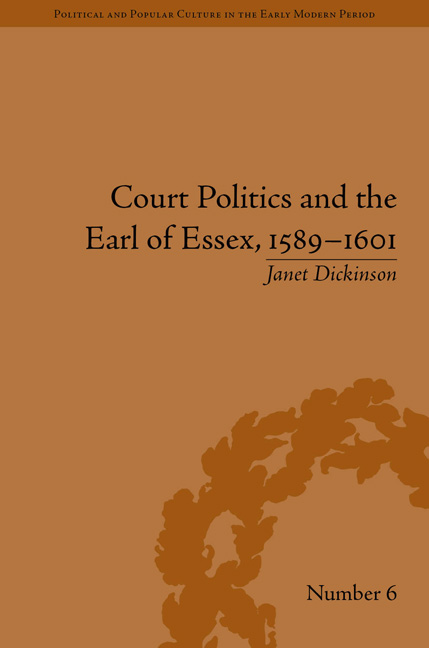Book contents
- Frontmatter
- CONTENTS
- Dedication
- Acknowledgements
- Introduction
- 1 Chivalric Culture and the Earl of Essex
- 2 The Virgin Queen and Her Lovers
- 3 ‘This Late Unhappy Accident’: The Rebellion of 1601
- 4 Faction in the 1590s?
- 5 Essex and Cecil
- 6 Essex and the Essexians
- 7 Elizabeth's Last Decade: Cult or Crisis?
- Notes
- Bibliography
- Index
4 - Faction in the 1590s?
- Frontmatter
- CONTENTS
- Dedication
- Acknowledgements
- Introduction
- 1 Chivalric Culture and the Earl of Essex
- 2 The Virgin Queen and Her Lovers
- 3 ‘This Late Unhappy Accident’: The Rebellion of 1601
- 4 Faction in the 1590s?
- 5 Essex and Cecil
- 6 Essex and the Essexians
- 7 Elizabeth's Last Decade: Cult or Crisis?
- Notes
- Bibliography
- Index
Summary
Now mark me how I will undo myself.
I give this heavy weight from off my head,
[Bolingbroke accepts the crown]
And this unwieldy sceptre from my hand,
[Bolingbroke accepts the sceptre]
The pride of kingly sway from out my heart.
The night before the rebellion Essex's followers commissioned a special performance of Richard II, probably Shakespeare's version of the play. This playing of the story of the usurpation of Richard II by the popular hero Henry Boling-broke has been interpreted by some historians as being intended to boost the Essexians’ morale before the next day's action. In the investigations carried out immediately after the rebellion, much attention was paid to the staging of Richard II and its deposition scene. The historian Sir John Hayward was arrested and questioned over his The First Part of the Life and Raigne of King Henrie the IIII, published in 1599 and dedicated to Essex, which had ‘seemed to condone the deposition of Richard II’. Famously, in August 1601 Elizabeth is reported to have told the antiquarian William Lambarde ‘I am Richard II, know ye not that?’ The story of a monarch who had allowed himself to be led astray by evil counsellors and the consequently justified usurpation of his throne by one of his noblemen might be said to have held many parallels to the situation of 1601.
- Type
- Chapter
- Information
- Court Politics and the Earl of Essex, 1589–1601 , pp. 65 - 78Publisher: Pickering & ChattoFirst published in: 2014

